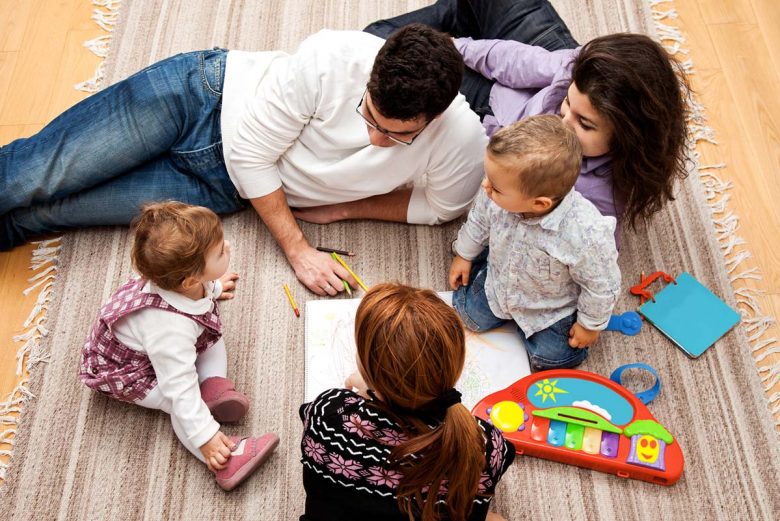
Each child has different natural social skills
Ever wish your child would respond differently to people? Some kids can be bouncing off the walls, while others are so reserved you wonder how to get them out of their shell. How do you help them find the right balance?
In this episode, Carol and Anne share tips to support all 4 Types of children in developing their social skills in a way that’s comfortable and true to them.
This episode’s Parenting Practice
Pay attention to what support your child needs this week in developing their social skills, true to their nature. Use the a-ha’s you receive from this episode—whether it be apologizing for pushing your child into interactions, validating them, or reinforcing the social skills they’re naturally good at.
Transcript of podcast episode
Carol: …definitely. To kiss someone? I wouldn’t wanna do any of that. I’d be like, “I’m going with the 2s and 4s. I’m out of here.”
Welcome to “The Child Whisperer” podcast. I’m your host, Carol Tuttle, author of the bestselling parenting book “The Child Whisperer.” I’m with my co-host Anne Tuttle Brown.
Anne: I notice when my family comes to visit, my Type 2 and Type 4 children generally don’t act excited to see them and don’t greet them in an animated way. My Type 3 5-year-old, on the other hand, is bouncing off the walls with excitement. I’m a Type 3 and, in the past, have been pushy about how the kids should show relatives affection, but it always felt forced, and I was frustrated that I always had to remind them to do this. The older kids are ages 9, 12, 14, and 15. They are definitely old enough to help make family members feel welcome. I now think they don’t do it because I’m pushing them into it in ways that are not supportive for their type. My question is what is the Type 2 and Type 4 way to engage with family we don’t see extremely often? What sort of social responsibility, as host and hostesses, should I be trying to instill in my children that is appropriate for them?
Carol: I also wanna add, the mom shared in her question to us, “If it was just one or two of the kids, I could explain, ‘That’s just their way.’ But when it is basically the entire family acting this way, the person can feel we just don’t care.'” So there’s this kind of a layered experience. I think the mom is getting close to owning this, that her pushiness has created the opposite effect of what she hoped would happen, that, somehow, her requiring them to act a certain way, they would. Where now they’re counter-acting it. They don’t want… It’s too much, it’s overwhelming. It’s created it to be a forced situation where it doesn’t feel natural, they can’t be themselves, and now they’re just resistant to the whole experience where seeing family now is a negative versus a positive because now we have to do all these things that Mom wants.
So I’d suggest the first thing she should do is own up to it, like, admit, her children are old enough, 9, 12, 14, and 15, those older children, just say, “I’ve been pushing you to behave a certain way that I now know isn’t honoring of you, and I apologize. And I’ve probably messed up this whole family thing, where I’m now noticing that you’re not even looking forward to it. I’d love to help support you in changing that so it’s a positive experience in your life.” Children respond very favorably to parents owning things, apologizing, and then reaching out to say, “Hey, let’s come together and change the course of this.”
Anne: Yeah. And she could even share from a healthy space, like, what she would love to experience, and then her kids could have a place to share, “Well, I don’t know if I could do that, Mom. Like, what about this?” Like, you come up with solutions together by sharing different ideas.
Carol: Yeah. And we’re gonna review what is healthy social development for each of the four types. Back to the parent though, before we get into that, what’s your motive? Is it so the relatives don’t feel bad and she makes a good impression? “Wow, look at our family. They’re all so socially…”
Anne: Well, she says, “The person feels that we just don’t care.” Like, she’s feeling like by acting this way, we don’t care about them. And as a Type 3, I wonder what other interactions she has had with Type 2s and Type 4s that she has maybe felt they haven’t been excited to see her because, in her mind, to have someone feel welcome, we have to be bouncing off the walls with excitement.
Carol: Yeah, and animated.
Anne: “You’re here, yay.” And the Type 2 and Type 4, you cannot conjure that up.
Carol: That’s the only measure of what makes a person feel welcome.
Anne: Even if a Type 2 and a Type 4 were generally excited to see somebody…
Carol: They’re not gonna do that.
Anne: …they’re not gonna bounce off the walls.
Carol: No. But what I…
Anne: They’re gonna be polite and say hello and have a conversation, but…
Carol: Yeah. The focus of what she is wanting this for, her priority, is the person, okay? What if you brought that back to… Certainly, you want people to feel welcome in your home. There’s a lot of ways for that to materialize. What if the motive first was not the other person, the guest, the family member, what if the motive was, “I want to support my children in developing healthy social skills?” That’s my motive here, not, “I’ve got to worry about somebody else and what they think of us.”
Let’s review each Type and what healthy social skills look like so a parent has a point of reference to know I’m helping them develop what’s natural for them in their social-skill ability.
Anne: So Type 1s, they are the fun-loving, social child. They can more readily engage and interact.
Carol: They do have more ability to outwardly express themselves and to chitchat and to respond to people talking to them that they’re less familiar with. Now, they might not always enjoy that, but they have more ability to kinda fake it and just do it. And so you have the most success with supporting them in recognizing that they may not enjoy every relative or social interaction but they have this ability to pull it off. And if people honor them and make it fun and light for them, they’ll definitely engage more readily. If they’ve got a relative that… I don’t think any child enjoys a relative that feels that they’re forcing themselves on them, their come-on’s too strong or they’re being forced to hug someone. And, definitely, to kiss someone? I wouldn’t wanna do any of that. I’d be like, “I’m going with the 2s and 4s. I’m out of here.” And so that is just your child’s nature as a Type 1, to have an outward-moving energy that allows them to socially connect more readily.
Anne: And support them in that to be a light experience. And they may connect more readily with the aunts, uncles, cousins that have that lighter energy, Type 1, or can get down on their level and create a youthful experience for the younger Type 1s.
Carol: And validate them. Say, “You know what? You have this natural gift to just be able to chat with people…”
Anne: Put a smile on people’s face.
Carol: …help them feel welcome. Make them feel really like you’re glad they’re there. You know, thank you. Thanks for being in our family because you bring that to this experience.” Let them bring that.
Anne: Yeah. That’ll give them more confidence to really accept and own their gifts. Now, a Type 2, they need familiarity, and so it will take more time for them to warm up. And so if family is coming for a couple of days, you can maybe expect, by the second day, they’ll be a little bit more comfortable and easing into the conversation or even playing with children their age, it just takes the familiarity. And so to make it easier for them, you’ll need to be with them, encourage them, be by them, just let them sit by you and kind of just take it all in.
Carol: You’ve had an experience with Sam recently, even with his cousin that he lives next door to, that he sees almost every day.
Anne: Yeah. It was about six months ago. So, Sam was still little. Conrad, who’s about a year younger than Sam, who’s Mark and Jaleah’s son, he wanted to go see him. And I think we were in an unfamiliar setting, so that might’ve made him a little more uncomfortable, and he wanted me to go with him. And I was like, “Really? You are uncomfortable to go see your cousin who you know so well?” But I think it was the unfamiliar setting that maybe made him a little bit more tentative, and so I went with him and he felt comfortable. He wanted to engage with him. And so there’s that, as a Type 2, they want to connect, they want to engage. They just need to warm up and they may need a little bit of holding hands or time to get comfortable.
Like you said for the Type 1, you can, you know, boost their confidence by sharing their gifts. You could do the same thing with Type 2, “You make people feel really at ease. You make them feel really comfortable.” Have them help you prep the house before relatives come, and I would say, definitely, like, prepare them for what’s to come. You could even, like, review names or tell stories about the people that you know and help them feel a connection to them.
Carol: Type 3 children have a confidence they can use in social situations. I wouldn’t say they’re necessarily drawn to being highly social. In fact, Type 3 children, they like to connect quick and get on with it, and they don’t want to sit around and talk with relatives. They want to go do something with them, be engaged with them in an activity. So, they have this social ability, yet they’re not necessarily looking for it because they just wanna have conversations. There’s an opportunity to experience something with a relative.
Anne: It’s like, “Great, you’re joining me in this activity? Okay, great, more people to go do something with.”
Carol: I know. When I go visit Jenny and my Type 3 grandson, he’ll connect very quickly with me, “Hey, Grandma,” but he’s not slowing down to, like, hang out with me. I’ve got to kinda meet him in his space and what he’s up to or engage him in something to now have a social interaction with him rather than just… He’s not interested. He’s like, “Why are you asking me all these questions? Like, come on. Let’s go do something.”
Anne: Yeah, “Make it quick.” I think you can build a Type 3’s confidence by, you know, “People love to do things with you. Why don’t you oversee the game night?” or, “I want you to take these kids out and go play a game with them,” or, “Why don’t you give the house tour and show them where their room is?” People come over to my house and my daughter is like, “Okay. I’m the leader. Follow me.” And I’ll remind her, “You’re so good at making friends. You make those connections really quickly.”
Carol: She’s looking for someone to do something with. Like, we’ll be at…
Anne: Or to be in charge of. Give them something to be in charge of. Maybe they don’t have to be connecting, but, “Hey, can you help in the kitchen, get ready for this meal?” And they’re gonna feel big and responsible and excited to engage in that way.
Carol: And then the teenage children can have…in each of these cases, once they know this about themselves, they’ll use this insight in their own navigation. And you’re now playing the role of supporting them because you’ve helped set them up for success by honoring their social tendencies.
Now, our Type 4 child is the most reserved and the more private in their experience with who they choose, just like with their food, they’re particular in who they will let…
Anne: Selective.
Carol: …get close to them and who they feel that they want to open up to, and so they’re going to be more… They have every ability to be polite and to welcome someone, to help them feel that you’re glad they’re there, yet they’re not someone that’s going to get the conversation going with a relative or someone they don’t see very often, even someone they see a lot. You know, with my Type 4 grandchildren, they have this speculative look on their face until they’re…
Anne: They’re sizing you up.
Carol: …about age 7 or 8. And they’re still assessing me to consider if they want to connect or not. My youngest Type 4 grandson who’s only 15 months, he still is really tentative about connecting with me. It’s just not matured to that place yet. I could take that very personally and think, “Oh,” you know, and force this child to have a connection with me. I’m like, “All in good time.” I understand his Type 4 nature. And he’s very particular, and he has his preferences, especially when mom and dad are around, he’s gonna choose them over me.
Anne: So when I married into my husband’s family, I had a niece who was about 3 years old, and she was a Type 4. And she wouldn’t come to me like the other kids would, and I just didn’t force it. I’d say hello. I would maybe engage with her, but I would give her her space. And then one day, she finally came to me and engaged with me, and I was like, “Yes.” And I think just allowing her that space rather than forcing it or, like, going over just to try and make this connection really supported her in her Type 4 nature.
If you have relatives coming to your space and staying in your home, I would have a conversation with your Type 4 ahead of time, “Okay. Will they be using anyone’s bedroom or bathroom? Will you need to be sharing your stuff?” And I would, say, err on not using the Type 4’s space, keeping that private, and knowing that they can have some time to themselves throughout the family activities so that they can have that solidarity and private time to ground themselves. This is really important as a Type 4.
Carol: Especially any belongings they don’t want their cousins…
Anne: And if you’re a Type 4…
Carol: …getting into.
Anne: Yeah, exactly.
Carol: Yeah. If you have anything around the house you don’t want broken, put it away.
Anne: Yep. As a Type 4 parent, I would say if you have a lot of family coming, make sure that you have some breaks along the way as well.
Carol: These are all great insights when you’re visiting family in large groups as well, like family reunions, family gatherings, and just letting your children develop in their own social way will be the most supportive, that everyone has the ability to have social skills true to their nature. We see a lot of the side effect of this being mismanaged in a child’s life in our adult community where people are now healing this misunderstanding that their parents had of them when they felt forced to try and be social in a way that wasn’t natural for them. And then they judged themselves as they were flawed, they were inadequate, somehow they should be different than who they are. And it’s very healing for especially Type 2s and Type 4 adults in our community to let this go and realize, “That’s not me, and I should not have to force it. It’s appropriate to be social in my way.” So you’re really helping your children avoid some fallout in their adult years and some misunderstandings of themselves.
Anne: This week’s parenting practice is to support your child in developing their social skills true to their nature. What ahas have you had during this podcast, and what can you do to support your child in creating a positive social experience true to their type?
Carol: Yeah. What would be that next step from the aha you received? Maybe it is going to your older children and apologizing, being accountable for trying to force them to be a way that truly they’re not, maybe it’s validating them, empowering them with this information and through recognition of what they’re naturally good at socially, to reinforce, to continue to develop that. You’ll know what your next step is based on that aha. Put it to practice this week.
Thanks for listening. For more support, go to thechildwhisperer.com where you can purchase the book, subscribe to our weekly Parenting Practice email, and find a transcription and audio of “The Child Whisperer” podcast.
Anne: If you’re listening on iTunes, thank you for leaving a review. If you have a parenting question, please send it to [email protected].



